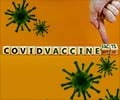A new study confirms the risk of heart inflammation is comparable lower following COVID-19 vaccination than other non-COVID-19 vaccines.

‘Among COVID-19 vaccinations, the risk of myopericarditis was higher for those who received mRNA vaccines (22.6 cases per million doses) compared to non-mRNA vaccines (7.9 cases per million doses).’





They found no statistically significant difference between the incidence of myopericarditis following the COVID-19 vaccination (18 cases per million doses) and other vaccinations (56 cases per million doses).“Our research suggests that the overall risk of myopericarditis appears to be no different for this newly approved group of vaccines against COVID- 19, compared to vaccines against other diseases. The risk of such rare events should be balanced against the risk of myopericarditis from infection and these findings should bolster public confidence in the safety of COVID-19 vaccinations,” says Dr. Kollengode Ramanathan, a cardiac intensivist at National University Hospital, Singapore, and corresponding author.
Myopericarditis is a condition that causes inflammation of the heart muscle and, in some cases, severe permanent heart damage. It is most often caused by viruses but can also occur after vaccination in rare instances.
There have been reports of myopericarditis following mRNA-based COVID-19 vaccination, especially in adolescents and young adults. A new study aimed to determine whether this increase in reporting was due to a true increase in incidence or a result of improved reporting systems and recall bias.
Researchers analyzed more than 20 studies from international databases with reported incidences of myopericarditis following any type of vaccination between January 1947 and December 2021.
Advertisement
The rate of myopericarditis following COVID-19 vaccination was 18 cases per million doses. For all other viral vaccinations combined, the rate of myopericarditis was 56 cases per million doses.
Advertisement
To put the findings into context with the risk of myopericarditis following COVID-19 infection, researchers conducted a post-study analysis.
Among 2.5 million patients who were hospitalized with COVID-19, many of whom had clinical or radiological suspicion of myopericarditis, 1.1% had myopericarditis.
However, while these figures provide a frame of reference, the results are not directly comparable with the number of cases of myopericarditis following COVID-19 vaccination due to different units of measurement.
In addition, comparisons have been made across different periods for different vaccines. Diagnostic tools might have differed or not been available leading to lower reporting of cases in earlier studies.
Source-Medindia















